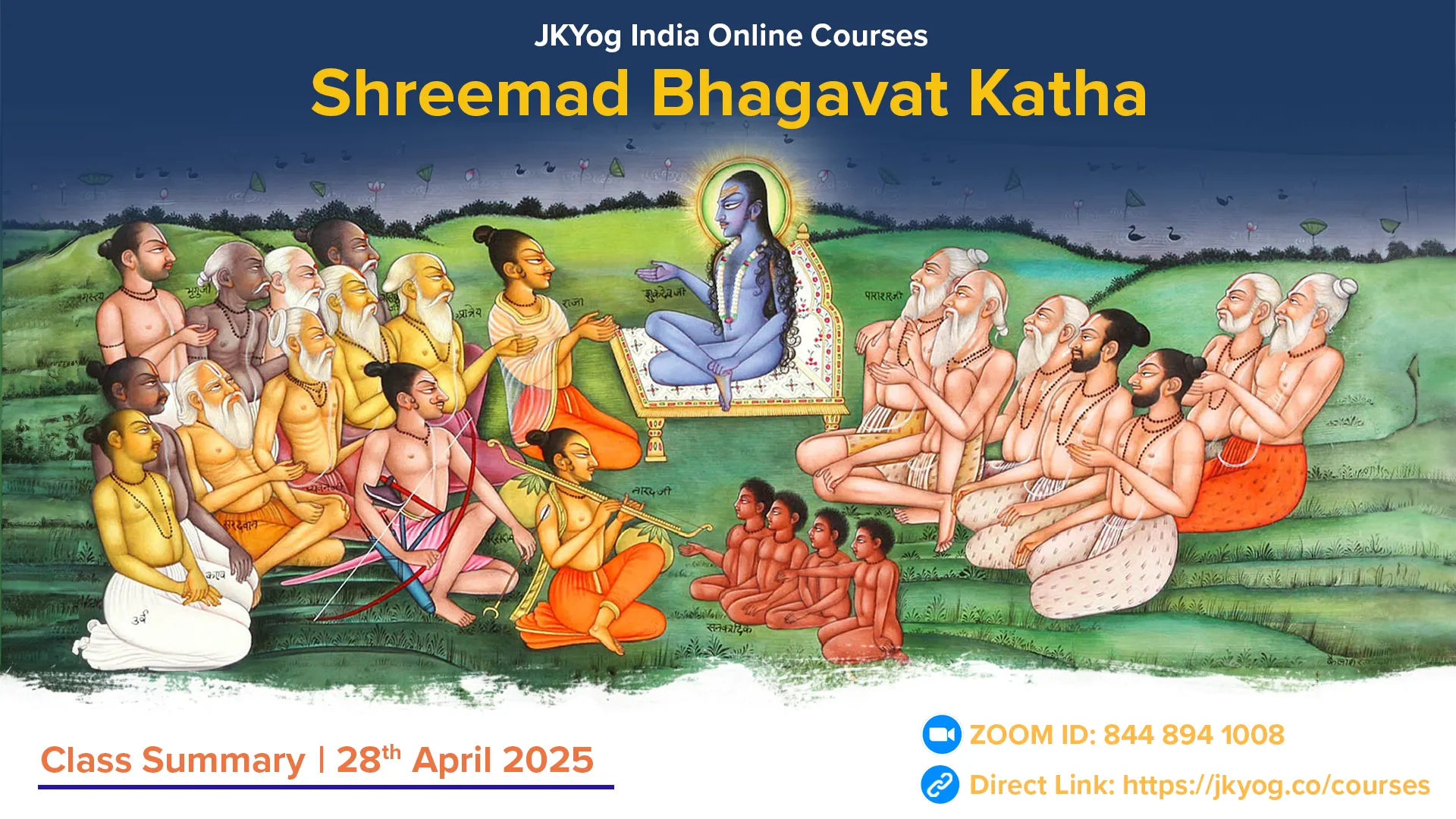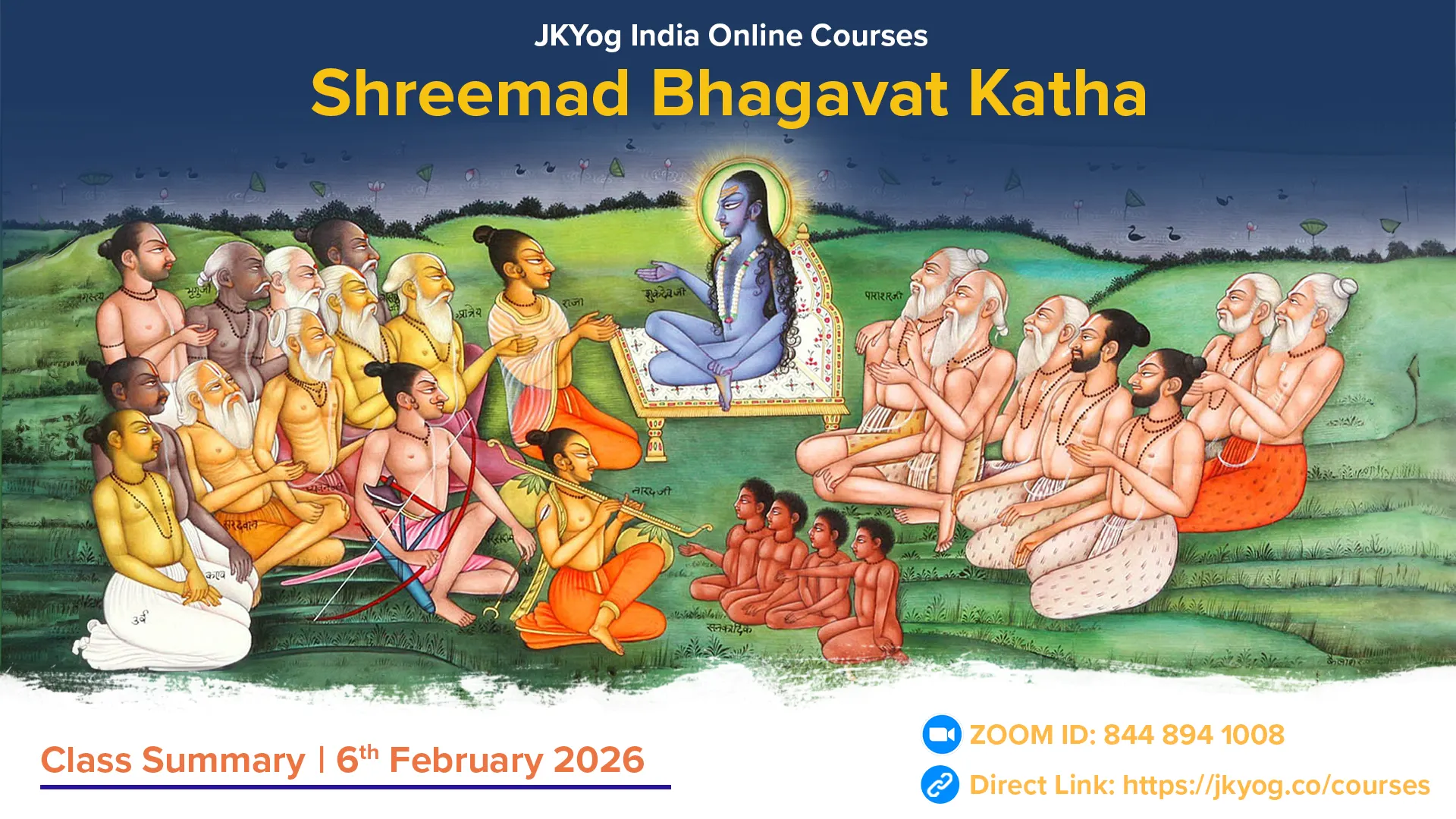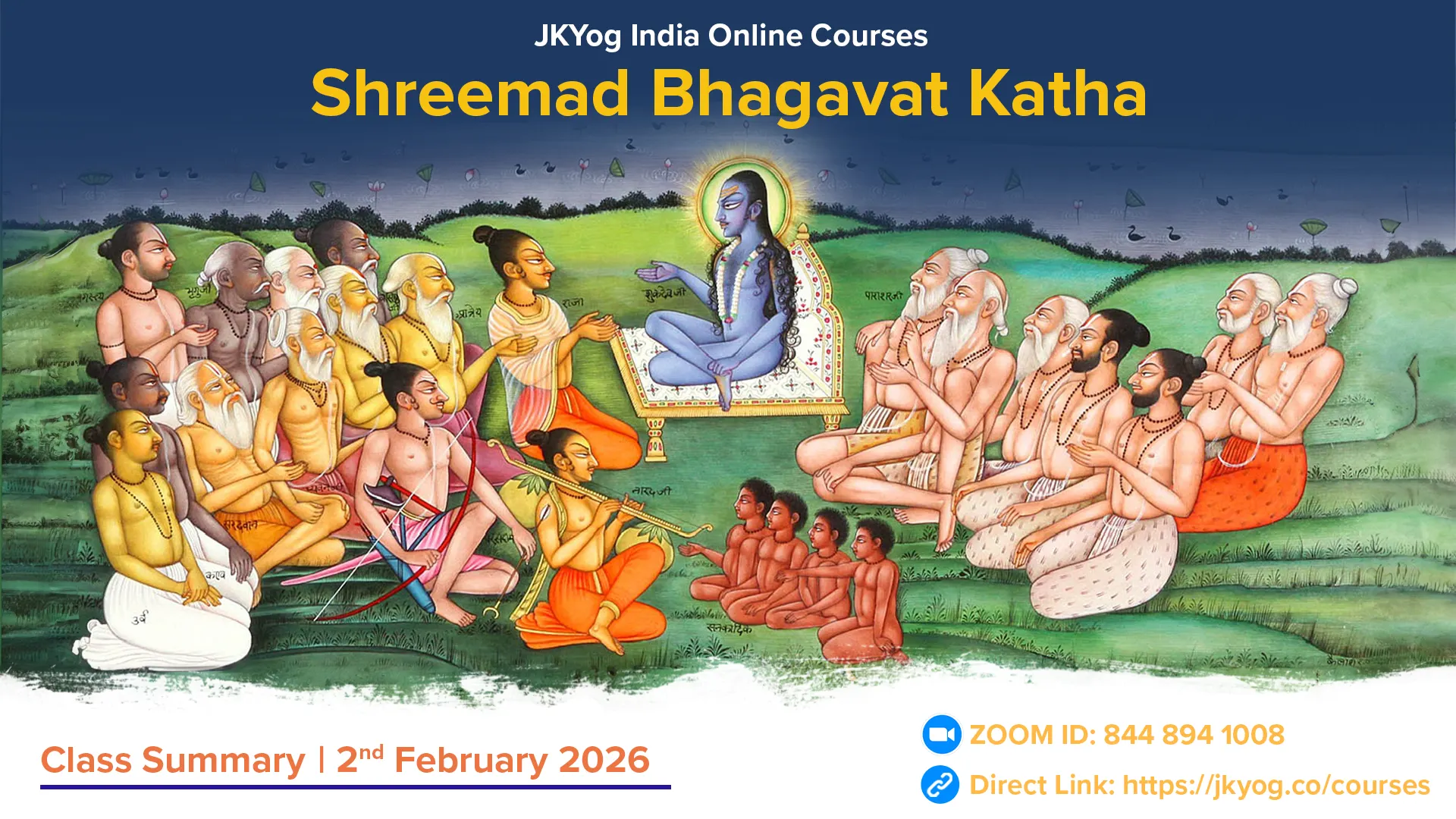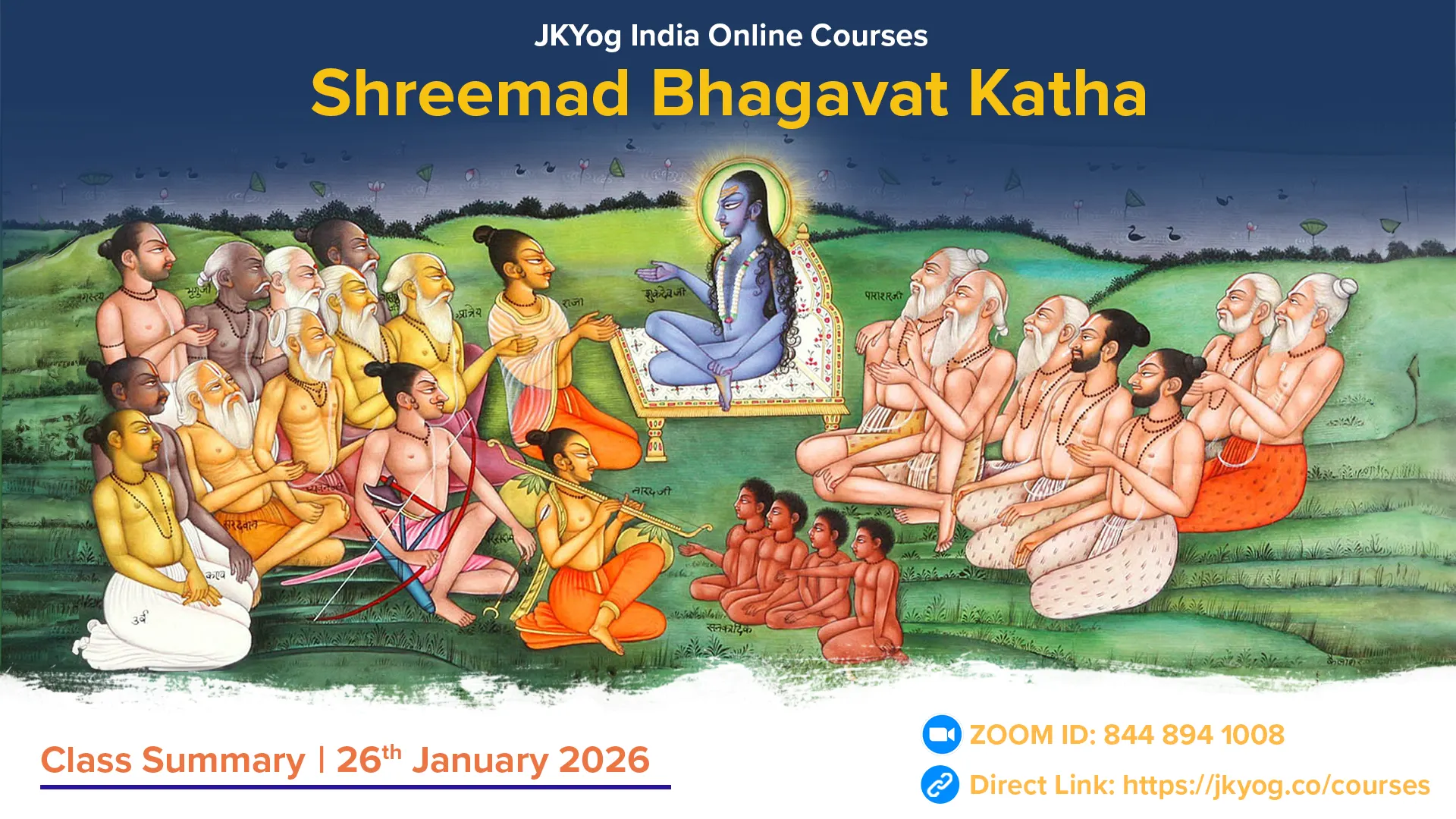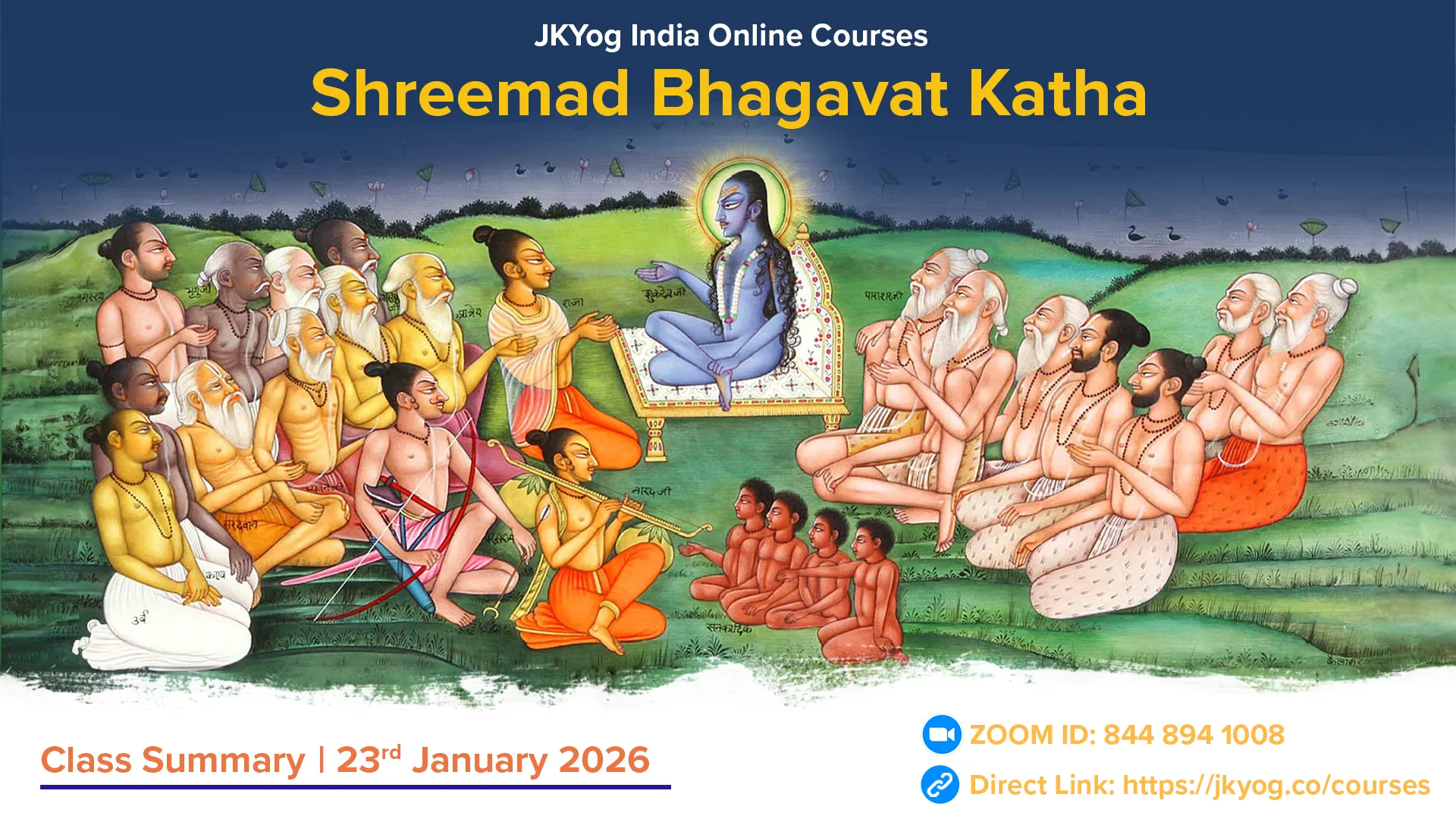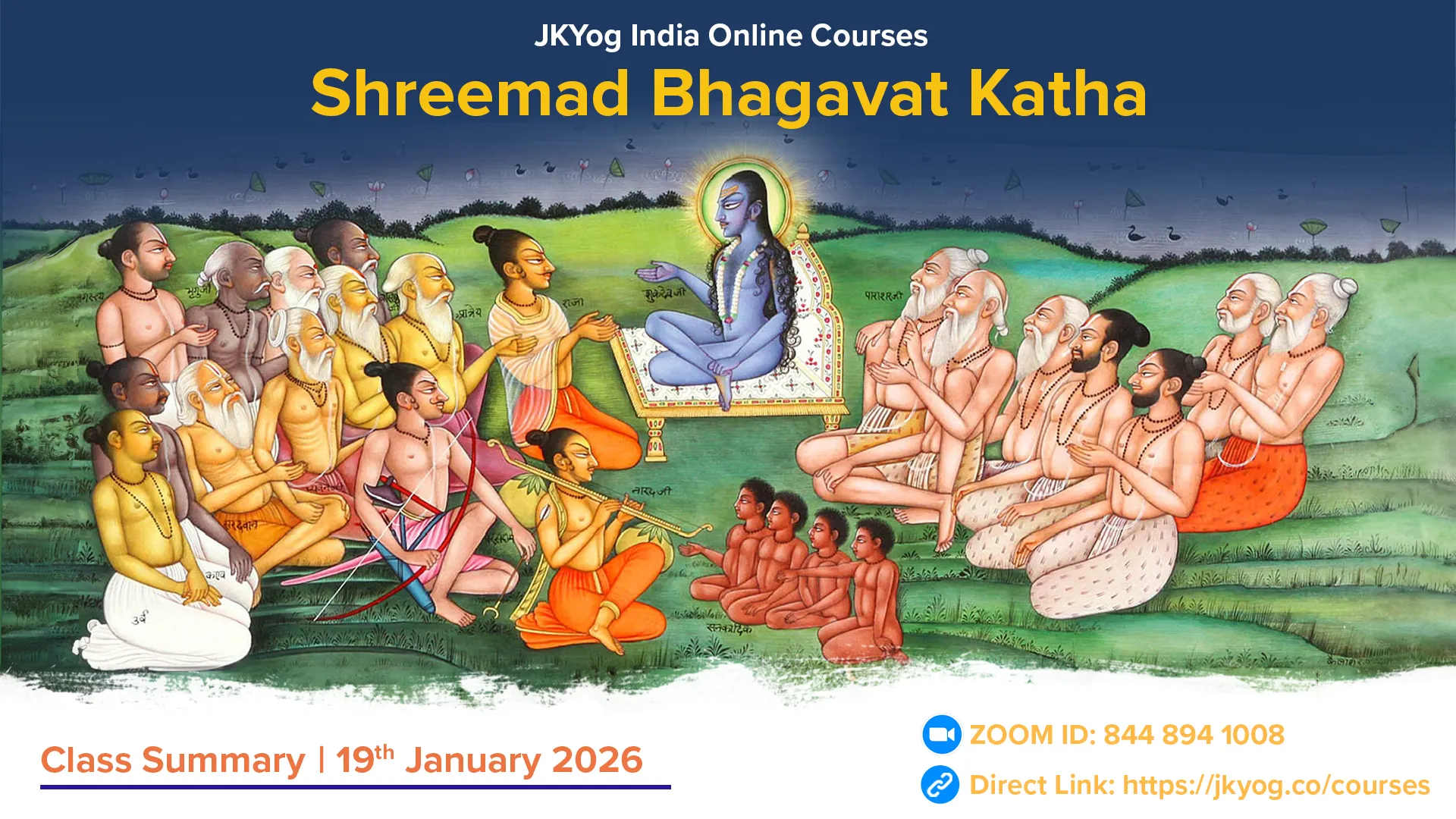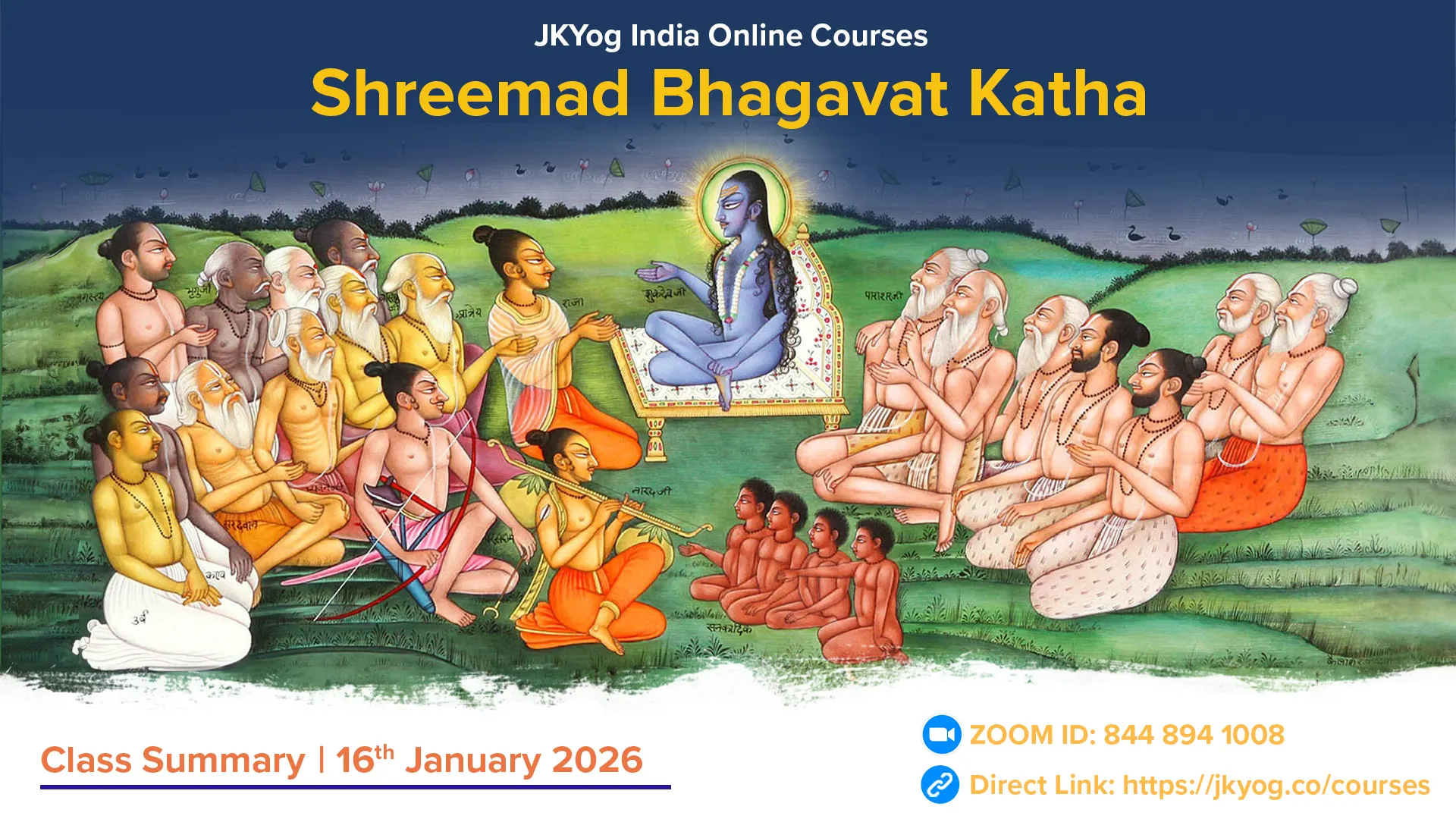Shreemad Bhagavat Mahapuran- Canto: 6, Chapters: 17-19
Chitraketu spends millions of years performing penance and roaming in the valleys of Mount Sumeru. His body remains ever-powerful, and his senses undiminished. Great sages, siddhas (perfected beings), and celestial bards (chāraṇs) sing his praises, while the women of the vidyādharas (celestial beings skilled in mystic knowledge) sing about the divine qualities and pastimes of Bhagwan before him.
One day, Chitraketu is travelling through the skies aboard a radiant, divine aircraft gifted to him by Bhagwan. Suddenly, his eyes fall upon an unusual sight—Bhagwan Shiv is seated in an assembly of sages and siddhas, with Bhagwati Parvati seated on His lap. Shivji is embracing Parvatiji with one arm. Witnessing this, Chitraketu is surprised. Without descending from his aircraft, he laughs loudly and sarcastically remarks that one who is the spiritual master of the entire universe is sitting in a public assembly with his wife on his lap like an ordinary householder. He further says that even common people engage with women only in private, yet here is such a sight in a public gathering.
Bhagwan Shiv hears Chitraketu’s words and smiles but says nothing. The other sages and siddhas in the assembly also remain silent. Chitraketu, unaware of Shivji’s supreme position and greatness, mocked Him out of pride. Seeing this audacity, Bhagwati Parvati becomes angry. She says that even exalted personalities like Brahmaji, Naradji, and the Sanatkumaras worship Shivji, and yet this person has behaved with disrespect and irreverence. Therefore, she curses Chitraketu to take birth in a sinful demon form so that he may never again dare to insult any great soul.
Shree Shukadevji tells King Parikshit that when Parvatiji cursed Chitraketu, he respectfully descended from his aircraft, bowed his head, and tried to pacify her. With folded hands, he humbly says, “Mother Parvatiji, I gladly accept your curse, for the words of divine beings manifest only as a result of one’s own destiny (prārabdha). The soul is neither the doer of joy nor sorrow—nor is anyone else. Everything occurs due to the flow of the three gunas—sattva, rajas, and tamas. Heaven, hell, pleasure, and pain are all illusions of maya. The Supreme Soul, Shree Hari, remains equal to all, beyond maya, and free from attachment and aversion.”
Chitraketu also clarifies that he is not apologising to escape the curse but only to express regret in case his words cause any undue offence. Then, having appeased Bhagwan Shiv and Parvatiji, he boards his aircraft and departs. The sages and gods in the assembly are stunned by his deep wisdom and equanimity.
After this, Bhagwan Shiv speaks to Parvatiji, “You have now witnessed the glory of a selfless devotee of Shree Hari. Those who have surrendered to Bhagwan are never afraid in any situation. They remain unaffected by the joys and sorrows, birth and death of this dreamlike world, seeing them as mere plays of maya. Even great sages like Brahmaji, Sanatkumaras, and Naradji cannot fully comprehend the mysteries of Bhagwan’s divine play. Those who consider themselves independent gods can never understand Bhagwan’s true nature. Shree Hari sees no one as friend or foe; He is the indweller of all and most beloved of all. Chitraketu is also His dear devotee.”
Hearing Shivji’s words calms Parvatiji’s anger. Shree Shukadevji tells Parikshit that this same Chitraketu took birth in a demon form as Vritrasur, but even there, he remained fully devoted to Bhagwan in knowledge and Bhakti (devotion).
Children of Kashyap from Aditi and Diti
Aditi was Kashyap’s first wife and the mother of many devatas.
- Savita and his wife Prishni had eight children: Savitri, Vyahriti, Trayi, Agnihotra, Pashu, Soma, Chaturmasya, and Panchamahayajna — all related to Vedic rituals and cosmic functions.
- From Bhaga and his wife Siddhi were born three sons — Mahima, Vibhu, Prabhu, and a daughter — Ashish (Blessing).
- Dhata, another son of Aditi, had four wives: Kuhu, Siniwali, Raka, and Anumati, who gave birth to Sāyam (Evening), Darsha (New Moon), Pratah (Morning), and Purnamasa (Full Moon) respectively — these represent lunar phases.
- From Vidhata and his wife Kriya, five sacrificial fires known as Purishya Agnis were born.
- Varun and Charshani gave birth to the reincarnation of Bhrigu. The great sage Valmiki also appeared as a son of Varun.
- From the combined energy of Mitra and Varun, stored in a pot, Agastya and Vasishtha were born.
- Mitra and Revati had three sons — Utsarga, Arishta, and Pippala.
- Indra and his wife Shachi had three sons — Jayant, Rishabh, and Meedhvan.
- Bhagwan Vishnu Himself incarnated as Vaman (Upendra) and requested three steps of land from King Bali, thereby measuring the three worlds.
- Vaman’s wife Kirti gave birth to Brihachchhlok and other children.
Diti, Kashyap’s second wife, gave birth to daityas.
- The two primary sons were Hiranyakashipu and Hiranyaksha.
- Hiranyakashipu’s wife, Kayadhu (daughter of the danav Jambh), bore him four sons — Sanhrada, Anuhrada, Hrada, and Prahlad, and a daughter — Simhika.
- Simhika married the danav Viprachitti, and their son was Rahu — the same being whose head was severed by Bhagwan Vishnu’s chakra during the churning of the ocean when he attempted to drink Amrit.
- Sanhrada and Kriti had a son named Panchajan.
- Hrada and Dhamani had two sons — Vatapi and Ilval. Ilval once served Vatapi cooked as food to Sage Agastya.
- Anuhrada and Surmya had two sons — Baskala and Mahishasur.
- Prahlad’s son was Virochan, and Virochan’s son was the famous Bali (Balika).
- Bali’s wife, Ashana, gave birth to Banasur and his 99 brothers (total 100 sons).
- Banasur, after performing austerities for Bhagwan Shiv, became the chief of His gan (attendants). Even today, Bhagwan Shiv protects his city.
- Besides Hiranyakashipu and Hiranyaksha, Diti had 49 more sons, who are known as the Marutgan. They all remained childless and were later accepted by Indra as devas.
The Story of Diti’s 49 Sons – The Origin of the Maruts
King Parikshit asks Shukadevji, “What righteous deed did the Maruts perform that transformed them from daitya to devta?” Shukadevji replies that after Bhagwan Vishnu killed Diti’s two sons—Hiranyakashipu and Hiranyaksha—Diti became grief-stricken. She resolved to give birth to a son powerful enough to kill Indra. To fulfil her wish, Diti served her husband, Rishi Kashyap, with deep love and devotion, pleasing him immensely.Enchanted by her service, Kashyapji agreed to grant her a boon. She asked for a son who could slay Indra.
Although troubled inwardly that this would be Adharma (unrighteous), Kashyapji had already promised. To handle the situation wisely, he advised Diti to perform a special ‘Pumsavana Vrat’ (a vow for begetting a virtuous son) for one year with strict discipline. He laid down several rules—no anger, no falsehood, no touching impure objects, and maintaining a disciplined lifestyle. He added, “If you perform the vow correctly, you will get a son who can kill Indra; but if there’s any mistake in the vow, the son will become Indra’s ally.”
Diti agreed and began observing the vow with full discipline. Indra, having learned her intention, cleverly disguised himself and came to her hermitage. He began serving her dutifully—bringing flowers, fruits, roots, sacred grass, twigs, and water from the forest at proper times. Just like a hunter disguises himself to trap a deer, Indra, in a deceitful form, starts serving Diti with the aim of finding a fault in her vow. Despite his watchful eye, he could not find any lapse and continued serving her. Now Indra grew anxious and thought, “What should I do to ensure my safety?”
One day, Diti, weakened and influenced by divine providence, decided to sleep at dusk without performing Achaman(sipping holy water) or washing her feet. Taking advantage of this moment, Indra used his yogic powers and entered her womb.
Chakarta saptadha garbham vajreṇa kanakaprabham
Rudantam saptadhaikaikam mā rodīriti tān punaḥ
Using his thunderbolt (vajra), he split the golden-glowing foetus into seven parts. When the parts began crying, he said, “Don’t cry, don’t cry,” and then split each of the seven into seven more, making forty-nine pieces in total. (Bhagavat 6.18.62)
When Indra tried to destroy them, the children folded their hands and pleaded, “O Indra! Why are you killing us? We are your brothers—the Maruts!” Then Indra realised their divine nature and said, “Very well, you are my brothers. Do not be afraid now.”
Shukadevji says that just as nothing could harm you (Parikshit) when Ashwatthama released the Brahmastra, similarly, by the grace of Bhagwan Narayan, the foetus of Diti did not perish despite being cut by vajra. This is not surprising—for one who even once worships the Supreme Narayan gains a divine nature. And Diti had worshipped Him for nearly a year! Thus, the forty-nine Maruts joined Indra and became fifty companions. Indra did not bear any enmity and accepted them as celestial Soma-drinking deities.
When Diti awoke, she saw forty-nine radiant children glowing like fire alongside Indra. She was greatly pleased. She asked, “I performed this intense vow for the birth of just one son who would terrify Aditi’s children. I had resolved for one child—then how did I get forty-nine?”
Indra replied, “I had learned your true intention. So, for my own benefit, I came down from heaven and served you. I had no righteous motive. As soon as I noticed a lapse in your vow, I cut the foetus into pieces. First into seven, who became seven boys. Then, I split each into seven more. Even then, they did not die but became forty-nine. Witnessing this amazing event, I realised that this must be the natural result of devotion to Bhagwan.” Indra then sought Diti’s forgiveness. She was pacified, and Indra returned to heaven along with the Maruts.
Pumsavana Vrat: The Ritual and Its Benefits
King Parikshit asks Shukadevji about the proper procedure of the Pumsavana Vrat, which pleases Bhagwan Vishnu. Shukadevji explained:
This vow fulfils all desires. A woman should begin it on the first day of the bright fortnight of the month of Margashirsha, with her husband’s permission. The rituals include:
- Taking blessings from Brahmins
- Bathing early and wearing white clothes daily
- Worshipping Lakshmi-Narayan with proper mantras
- Performing a havan (fire ritual) and making offerings with devotion
- Treating the husband with reverence, considering him as Bhagwan Himself
This vow grants happiness, prosperity, children, fame, and a fulfilling life. Women who observe it attain a joyful life. It also grants merit to widows, provides health and strength to the sick, and fulfils all wishes of the sincere devotee.
Summary: JKYog India Online Class- Shreemad Bhagavat Katha [Hindi]- 28.04.2025

